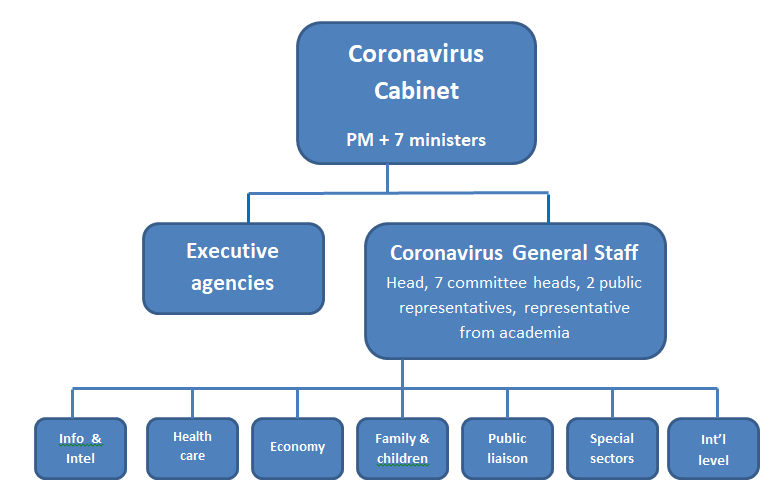Publications
INSS Insight No. 1302, April 19, 2020

The coronavirus is not about to vanish from our lives, so the quest for a one-shot silver bullet in the form of an “exit strategy” is dangerously misguided. Instead, we will have to learn to manage our lives as individuals, families, and workers under the constraints of the coronavirus; the same applies to running the country, the economy, and other aspects of society. We therefore must build an organizational structure for the sustained management of the crisis, which will include a wide range of governmental, civic, and professional actors.
Israel has thus far managed the coronavirus crisis quite successfully; at the same time, there have been some serious mishaps and failings, such as the lags in closing the loop in testing, contagion in nursing homes, and the unmonitored entry of hundreds of infected travelers from abroad. However, we are in the midst of a struggle of unprecedented complexity, and what is important now is not after-the-fact criticism, but a sober appraisal of what lies ahead, and the garnering of the best possible capabilities to deal with it.
In view of the great challenges looming, it is absolutely clear that the way the crisis has been managed until now (in a highly centralized manner, with too many "teams of experts" and no clear delineation of responsibility and authority) cannot go on. A fundamental restructuring is called forth, so as to be able to manage a prolonged and multidisciplinary campaign, with the participation not only of state agencies (that are not always fit for the task), but also of a broad range of public and civic agents, which can bring in a much richer set of competencies, knowledge and insights. To that end, sketched here is the organizational structure that should be implemented at the national level.

Heading the new framework will be the so-called Coronavirus Cabinet, with a structure and powers similar to those of the well-established State Security Cabinet. This new Cabinet will be charged with setting policy and taking major decisions on the management of the crisis, informed by the professional recommendations of the Coronavirus General Staff (CGS). The Coronavirus Cabinet will be headed by the Prime Minister, and will include the following ministers: health, finance, defense, labor and welfare, internal security, education, and interior.
The CGS will be appointed by the Coronavirus Cabinet, enjoy a well-defined legal standing, and have an appropriate budget at its disposal. It will comprise eleven members: the chairperson – an esteemed public figure with proven experience in managing complex systems; the seven heads of the committees; two public representatives; and a representative from academia.
The CGS will be tasked with data collection, analysis, research, and policy recommendations; to that end, there will be seven committees under its authority dedicated to the following tasks:
- Information and Intelligence: Epidemiology, testing, monitoring
- Health care: Treatment of coronavirus patients; treatment of other patients
- Economy: Macro, budget; sectorial policies; middle and long term planning
- Family and children: Education, domestic needs, resilience and psychological aspects
- Public liaison: Direct engagement with the public, hearings and round tables, communication
- Special sectors: Ultra-Orthodox, children with special needs, the elderly
- Regional and international level: Information gathering and collaborations, liaison with Jewish Diaspora communities.
These committees will include representatives of relevant government agencies, civil organizations, and sectors (such as Employers’ Associations), as well as other institutions or individuals who can contribute the required expertise and skills. The makeup of the committees must be well-balanced by gender, and be representative of Israel’s heterogeneous society. Some of the committees will also partake in execution and implementation.
This management framework should be established immediately, since this is not a passing crisis that will subside as quickly as it arose, but rather a shockwave whose tremors will deeply affect our way of life well into the future. Contending with its medium and long term reverberations requires a completely different management mode from what we have seen thus far, and the sooner we replace it, the better.
* Prof. Manuel Trajtenberg, of Tel Aviv University and the Samuel Neaman Institute for National Policy at the Technion, is a member of the INSS Board of Directors.


